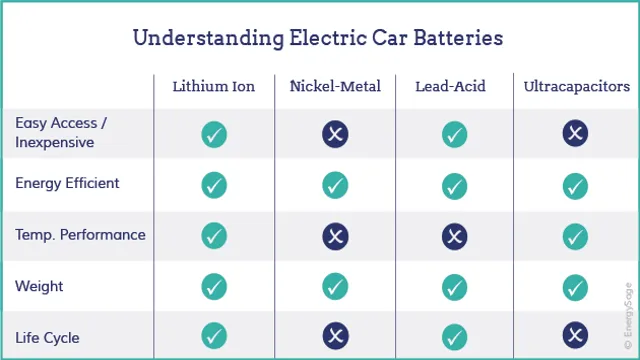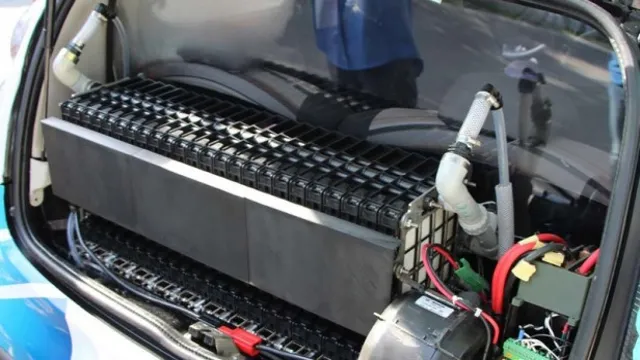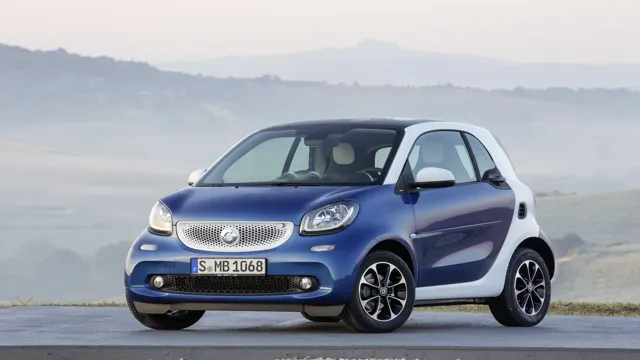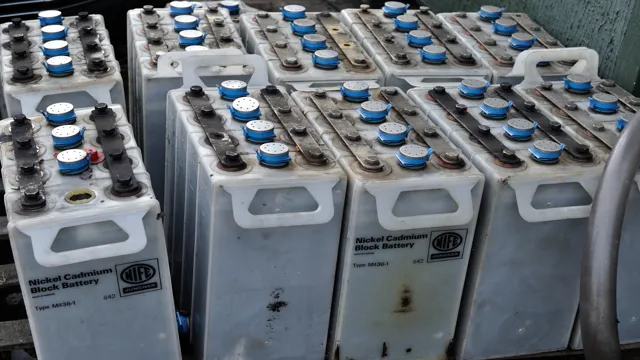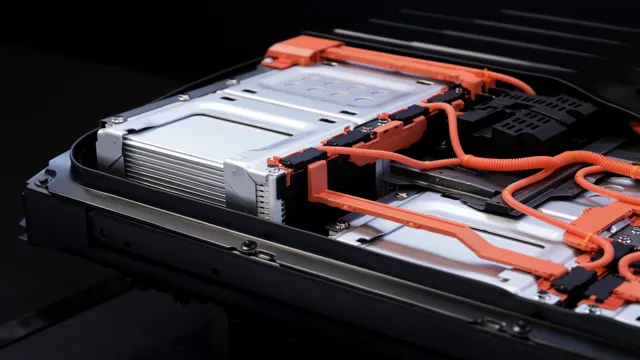Unpacking the Mysteries of Electric Car Battery Capacities: A Comprehensive Guide
Are you looking to buy an electric car, but concerned about its battery capacity? Well, you’re not alone. One of the biggest concerns for potential electric car owners is how far they can drive on a single charge. Battery technology has come a long way in recent years, but there are still some limitations.
In this blog post, we’ll explore the various electric car battery capacities available and what they mean for you as a driver. Think of it like shopping for shoes – you want to find the right size that fits your needs and lifestyle. Let’s dive in!
Overview of Electric Car Batteries
Electric car battery capacities are crucial to the performance and range of an electric vehicle. Generally, the battery capacity is measured in kilowatt-hours (kWh), which refers to the amount of energy the battery can store. The higher the capacity, the longer the range the car can travel on a single charge.
Electric car batteries can have different capacities depending on the make and model of the vehicle. For instance, the Tesla Model S has a range of up to 402 miles with a battery capacity of 100 kWh, while the Nissan Leaf has a range of up to 150 miles with a battery capacity of 40 kWh. It’s important to note that battery capacity is not the only factor that determines the range of an electric car.
Other factors like driving style, temperature, and terrain can also affect the range. Nonetheless, the advancement in electric car battery technology has made electric cars more practical and efficient for daily use.
What is a Kilowatt-hour?
A kilowatt-hour (kWh) is a unit of measurement used to calculate the amount of energy consumed or produced over a period of time. It is the amount of energy used by a 1000-watt appliance operating for one hour. Simply put, if your 60-watt lightbulb is left switched on for 17 hours, it would consume one kWh of energy.
Understanding kWh is essential when it comes to electric cars. The battery packs in electric cars are typically measured in kilowatt-hours, and this measurement gives an idea about the range and performance of the vehicle. For example, a battery pack of 60 kWh can provide a range of around 200-300 miles, while a battery pack of 100 kWh can offer a range of around 300-400 miles.
The higher the kWh rating, the better the performance and range of the vehicle. It’s important to have some knowledge of kWh when going electric car shopping, as the battery capacity plays a significant role in the overall value of your car.
Factors that Influence Battery Capacity
Electric car batteries are an integral part of any electric vehicle, as it is the battery that powers the electric motor. The battery capacity determines how much energy the car can store and therefore influences its range. Several factors impact the battery capacity, including the battery chemistry, temperature, charging rate, and age.
Different battery chemistries, such as Lithium-ion and Nickel-Metal Hydride, offer various advantages and disadvantages in terms of capacity, energy density, cost, and lifespan. Temperature affects the battery performance and capacity, as extreme temperatures can cause degradation or even damage to the battery. Charging rate also affects the battery capacity, as fast charging can degrade the battery faster than slow charging.
Finally, the battery capacity decreases with age, as the number of charging cycles reduces the battery’s ability to hold a charge. Understanding the factors that influence battery capacity is crucial in determining the range and performance of an electric vehicle.
Comparison of Popular Electric Cars’ Battery Capacities
When it comes to electric cars, battery capacity is a crucial consideration. The higher the battery capacity, the longer the car can go on a single charge. Comparing popular electric cars, the Tesla Model S boasts the largest battery capacity at 100 kWh, which provides a range of up to 400 miles.
The Chevrolet Bolt EV comes in second with a capacity of 66 kWh and a range of 259 miles, followed by the Nissan Leaf with a capacity of 62 kWh and a range of 226 miles. The Hyundai Kona Electric has a 64 kWh battery capacity, which allows for a range of 258 miles, while the BMW i3 has a smaller 42 kWh battery capacity with a range of 153 miles. Other factors such as driving style and weather conditions may affect the range of an electric car, but having a higher battery capacity provides a larger buffer and peace of mind for longer trips.
Tesla Model S vs. Nissan Leaf
When it comes to comparing the Tesla Model S and the Nissan Leaf, one of the main factors to consider is their battery capacities. The Model S has a much larger battery capacity of up to 100 kilowatt-hours, which allows for a longer driving range of up to 402 miles on a single charge. The Leaf, on the other hand, has a battery capacity of up to 62 kilowatt-hours, resulting in a driving range of up to 226 miles on a full charge.
While both cars can go the distance, the Model S offers a significant advantage for drivers who need to travel long distances without worrying about charging. It’s like the difference between a small backpack and a large suitcase – they can both hold items, but one has much more space than the other. Ultimately, the choice between the two cars comes down to the needs and preferences of the individual driver.
Chevy Bolt vs. BMW i3
When it comes to electric cars, the Chevy Bolt and BMW i3 are two popular models that are often compared. One of the key factors that sets them apart is battery capacity. The Chevy Bolt has a battery capacity of 66 kWh, while the BMW i3 has a battery capacity of 4
2 kWh. This means that the range of the Chevy Bolt is greater than the BMW i3, with an estimated 259 miles on a single charge compared to the i3’s estimated 153 miles. The size of the battery also affects the charging time, with the larger battery of the Chevy Bolt taking longer to charge than the BMW i
However, the Chevy Bolt’s longer range and larger battery make it a great option for those looking for a more practical electric vehicle, while the BMW i3’s smaller size and quicker charging time make it a good choice for city driving. Whether you prioritize range or convenience, both cars are great options for anyone looking to make the switch to electric.
Ford Mustang Mach-E vs. Audi e-tron
When it comes to electric cars, the battery capacity is a crucial factor that determines a vehicle’s range. When comparing the Ford Mustang Mach-E and the Audi e-tron, it’s evident that both have impressive battery capacities. The Mustang Mach-E offers options for a Standard Range battery with a capacity of 7
7 kWh or an Extended Range battery with a 98 kWh capacity. On the other hand, the Audi e-tron features a 95 kWh battery that provides up to 222 miles of range.
This means that the Mustang Mach-E’s Extended Range battery offers a range of up to 305 miles, significantly greater than the Audi e-tron’s range. Plus, the Mustang Mach-E allows for a faster charging option, enabling drivers to charge their car up to 80% in just 45 minutes. While both cars boast impressive battery capacities, the Mustang Mach-E edges out as the more spacious and range endurant EV.
Future of Electric Car Battery Capacities
As the demand for electric vehicles continues to grow, so do the advancements in electric car battery capacities. Improvements in battery technology have already led to increased driving ranges and faster charging times, but researchers and manufacturers are striving for even greater capabilities. With the development of solid-state batteries, which use a solid electrolyte instead of liquid, electric cars may see even larger ranges and shorter charging times in the near future.
Additionally, advancements in materials and manufacturing processes may lead to more affordable and environmentally friendly batteries. As electric car battery capacities increase, we can expect to see more widespread adoption of electric vehicles, leading to a greener and more sustainable future.
Advancements in Battery Technology
As electric cars become more widespread, much attention has been given to advancements in battery technology. One of the most exciting developments in this field is the potential for future battery capacities. The latest research suggests that electric car batteries could have much larger capacities, which would translate into significantly longer driving ranges on a single charge.
Imagine being able to drive your electric car for hundreds of miles without worrying about running out of power! Of course, there are still questions to be answered about how this technology will be implemented and how much it will cost. Nonetheless, the future of electric car battery capacities looks very promising indeed.
Potential Impact on Electric Car Market
Electric Car Battery Capacities One of the most critical factors that determine the success of the electric car market is the battery capacities of these vehicles. While electric vehicle technology has evolved significantly in recent years, the limited battery range continues to be a significant concern for many potential buyers. However, advancements in battery technology mean that we could potentially see significant improvements in battery capacity in the future.
Battery manufacturers are continuously researching and developing new battery materials and manufacturing processes that could result in longer battery range and faster charging times. If these battery improvements come to fruition, it could significantly impact the electric car market, making electric vehicles a more viable option for many consumers and increasing the market share of electric cars in the automotive industry.
Conclusion
In conclusion, electric car battery capacities are like brains – both can hold a lot of power but it’s how efficiently they use it that counts. Just like our brains need to be exercised and fueled with good nutrition to function at their best, electric car batteries need to be maintained and charged properly to give us the best driving experience. So let’s give our electric cars and our brains the care and attention they deserve, and we’ll be unstoppable forces of energy!”
FAQs
What is the average battery capacity of an electric car?
The average battery capacity of an electric car is around 60-100 kilowatt-hours (kWh).
How long does it take to charge an electric car battery?
The time it takes to charge an electric car battery depends on the battery capacity and the charging rate. On average, it takes around 30 minutes to charge an electric car battery to 80% capacity using a fast charger.
What factors affect the battery capacity of an electric car?
The battery capacity of an electric car is affected by several factors, including the size and weight of the car, driving habits, temperature, and the age of the battery.
How long do electric car batteries last?
The lifespan of an electric car battery depends on various factors, such as the type of battery, the usage patterns, and the environmental conditions. On average, electric car batteries can last between 8-10 years or up to 200,000 miles.
